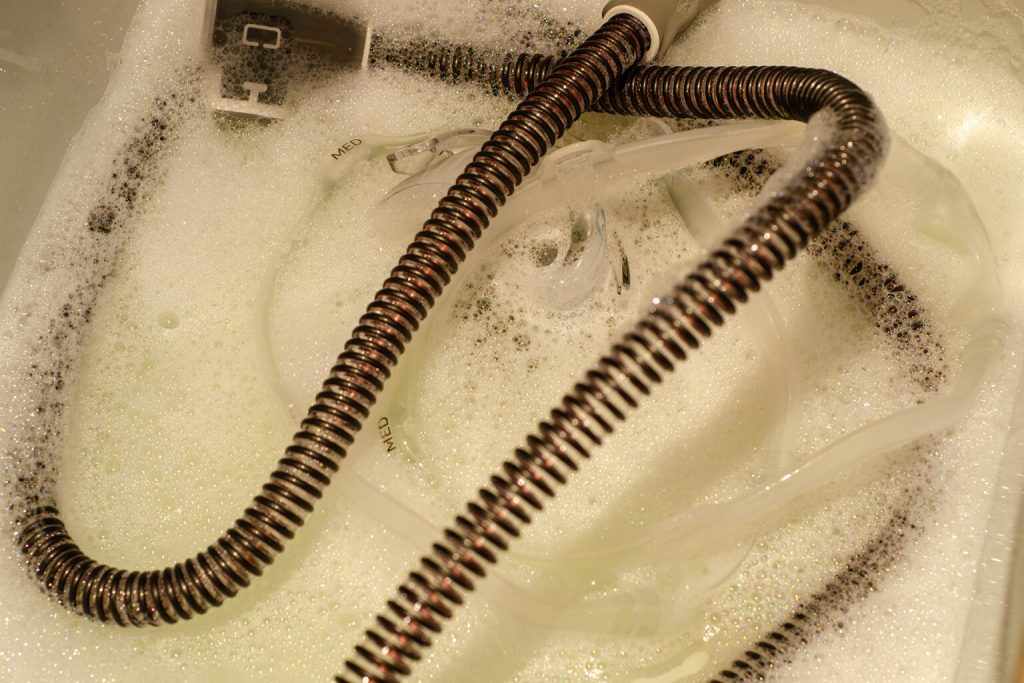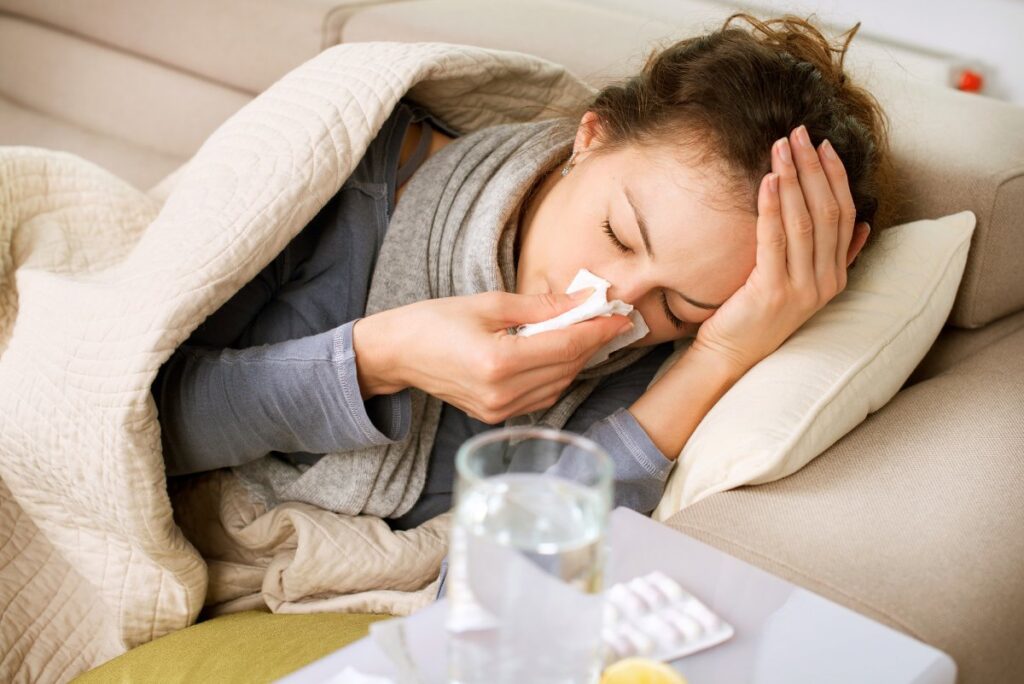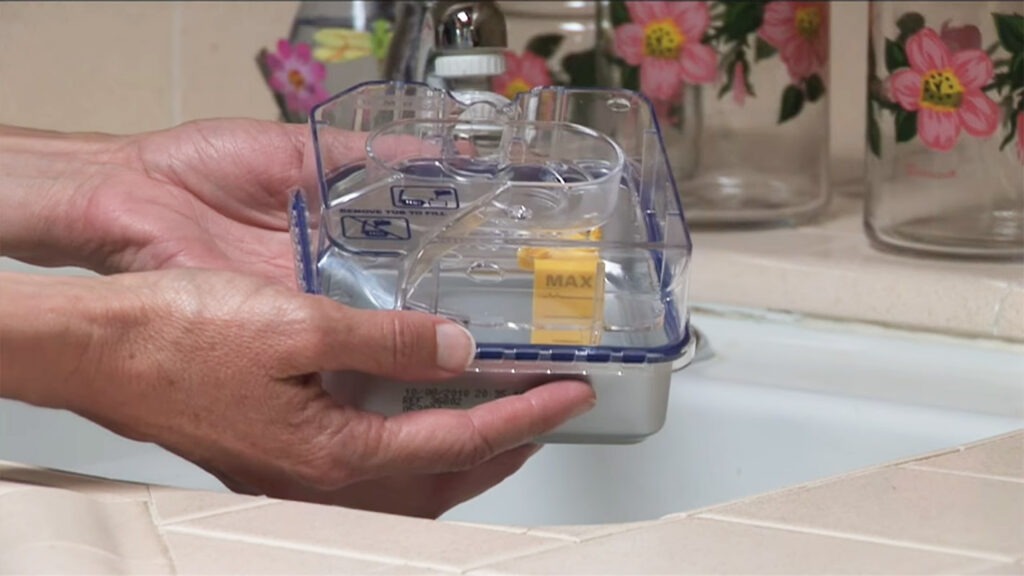Last Updated on May 5, 2021
Do you want to keep healthy and keep the germs off from spreading uncontrolled? Well, you need to learn the various ways to clean your CPAP equipment; it’s simply fantastic!
Once you learn about the best ways to clean this equipment, you’ll be guaranteed to be safe from contracting various illnesses, including colds, flu, and other infections. Indeed, you’ll drastically reduce the likelihood of getting sick. Further, this ensures that the air you breathe will always be clean.
Ultimately, if you learn to keep your CPAP machine, supplies, and mask ever clean, you’ll soon discover that your overall health and wellness have improved. In the end, the CPAP equipment’s longevity will be enhanced.
Well, let’s discover the ABCs of doing this.
Is it Really Necessary to Clean Your CPAP Equipment?
Some wonder whether it’s ever necessary to clean the CPAP equipment. In a moment, let’s consider whether this is necessary. First, think about this: Isn’t it true that you daily breathe the air that circulates through your CPAP machine? Even though this air is filtered and humidified, it’s crucial to ensure that the CPAP is kept spotlessly clean.
Also, cleaning your CPAP can help prevent some potential dangers and problems. Think about a few of these:
- Allergy symptoms
- Voiding the device warranty
- Mold exposure
- Bacteria exposure
- Increased risk for pneumonia and sinus infections
- Mineralization within the CPAP equipment
- Musty or foul odor
- Premature equipment breakdown
But another question comes, if it’s so important to clean your CPAP equipment, how-precisely should it be done? Well, you’ll soon discover that you can accomplish this quickly without much expense.
Lowering the Risk of Infections and Catching Colds
Keep this in mind – the proximity or nearness of your CPAP mask to the nose and mouth makes this an excellent breeding ground for countless germs. Remember that even if this doesn’t make you sick today, it could make you ill tomorrow. The solution is to clean your mask regularly.
Once you put in place a good cleaning schedule, you’ll eliminate the illness-causing germs. Further, your equipment will look better, smell better. Ultimately, you’ll begin feeling much better, and your health will significantly improve.
Lowering the Risk of Getting Ill Again
We all know that there’s nothing worse than frequently getting sick. However, if you don’t clean and its accessories well enough, you’ll be running the risk of getting re-infected.
If you wear a nasal pillow, you’ll find things getting worse. Why? Nasal pillows typically seal around the nostrils; this harbors bacteria from the sinuses whenever you get a cold. Because the nasal pillow is used close to the nose, a direct path is always created for the germs from your mask. This can make you feel sick again.
If you don’t clean your CPAP well, you’ll breathe in lots of germs whenever you wear your mask. These factors make it particularly important to maintain good hygiene when cold and flu are prevalent.
How Often Should You Clean Your CPAP Equipment?
You can have your sleep medicine physician or equipment provider recommending an excellent routine to clean your CPAP equipment. Generally, the suppliers of durable medical equipment and other experts suggest that you clean your mask, tubing, and the CPAP tank daily. Some might think that this is excessive. Regardless, you significantly lower the risk of mold exposure and other kinds of infections when you do this.
For best hygiene, experts generally recommend that you clean your CPAP equipment at least once a week. If you suffer from an upper respiratory infection, you’re advised to clean your equipment even more regularly. Ensure that you don’t share your equipment with anyone else since this can contribute to transmitted infections.
What’s the Difference Between Cleaning, Sanitizing, and Disinfecting the CPAP Mask?
Just like the ordinary germ, the difference between cleaning, sanitizing, and disinfecting the CPAP mask is virtually microscopic. However, when this is magnified for the CPAP universe, you’ll find some significant differences. Ultimately, there’s one common denominator – these processes are all designed to eliminate or lower the number of germs occurring on surfaces and objects. The primary difference is how each of these processes achieves that.
Essentially, cleaning your equipment will remove germs, dirt, and other impurities from objects’ surfaces; this action does not kill the germs. Nevertheless, once you clean the outer part of the CPAP machine, the hose’s outer part, and the mask itself, you’ll have done a great job in keeping these germs away. By cleaning the equipment, you drastically reduce the number of germs as well as other associated risks. Use water and soap to remove the germs from surfaces.
On its part, sanitizing considerably lowers the number of germs occurring on surfaces to a level that may be described as safe. However, it doesn’t completely eliminate germs. You can also remove the germs by disinfection. Disinfection comes with a critical difference- it uses the chemicals to kill the germs on or objects or surfaces. It’s always okay to disinfect your CPAP equipment’s external surfaces with a water-diluted disinfectant concentrate or mask swipes. An example is the Control III Disinfectant CPAP Solution.
The Best Ways to Clean Your CPAP Machine
You should clean your CPAP machine and its supplies daily. Follow the manufacturer’s recommendations closely. Alternatively, you should clean this equipment once a week. But if you’re sick, you should have a daily cleaning schedule. This is crucial right until you get better.
Follow this procedure to clean your CPAP mask as recommended:
Clean the CPAP equipment in the morning. This allows adequate time for the mask to dry.
Disassemble each part of your CPAP mask (including the water chamber) and unplug the equipment. Wipe the exterior using a clean, dry cloth to remove the dust and debris.
Wash the CPAP mask, it’s tubing, and the water chamber using warm soapy water and mild soap (like Ivory and Dawn).
Rinse the CPAP hose and other supplies using clean water. After washing, you may decide to disinfect the supplies using vinegar. Soak the supplies in a solution made up of 3 parts water and 1 part vinegar for about half an hour. Finish the cleaning by rinsing with clean water.
Allow time for all the supplies to air dry.
Essential Things to Remember:
Use distilled water in the CPAP humidifier – this avoids the build-up of bacteria and minerals.
Follow the manufacturer’s recommendations to clean the CPAP filters. Some may be rinsed using warm water; other disposables might need replacing.
Never place the straps or headgears in the dryer.
Never leave the equipment in direct sunlight to dry; this can cause discoloration.
How to Accelerate the Process of Cleaning
Don’t worry if you have no time to clean your CPAP equipment weekly; there are CPAP cleaning procedures and accessories that can reduce the time needed to clean the equipment.
Use CPAP Wipes:
You can use CPAP Wipes to reduce the machine and mask build-up. However, this shouldn’t necessarily replace the daily or weekly cleaning. It only helps lessen the debris build-up and accelerate the work process.
Use CPAP Spray:
You can use this to remove the bacteria and dust and refresh the mask.
Use CPAP Sanitizers:
You can choose from several types of uv or ozone sanitizers include SoClean, Lumin, and Motif Clean-z.
Some FAQs (Frequently Asked Questions) on CPAP Cleaning
Can One Get Sick if they Don’t Clean the CPAP equipment?
Yes, this can happen. There are risks in failing to follow the CPAP machine cleaning schedule. Wearing a dirty mask is among the commonest way for some to get sick while using the CPAP machine. The mask naturally gets in contact with the skin and its organisms when you wear it all night. After a while, the mask’s bacteria and oils may cause a skin rash or infection.
Some get sick from using the humidifier chamber’s dirty water. Unless you frequently clean the reservoir or replace it with distilled water daily, it may start growing mold or small bugs. Before long, you’ll be breathing this. This can make you contract infection-related illnesses like asthma.
Is it Really Worth Buying a CPAP Cleaner?
Of course, yes! The designers of CPAP cleaners specifically meant them to be used with the CPAP equipment. This ensures it’ll keep working well while preventing you from getting sick.
What Symptoms Accompany A Dirty CPAP Machine?
Some initial symptoms (of using contaminated components) include irritation and nasal congestion. These symptoms may be followed by worse problems, including nosebleeds, congestion, dryness, pesky runny nose, irritation, and burning.
Is it Advisable to Use Baby Wipes to Clean the CPAP Mask?
Yes, you can do so-if the swipes are unscented. Why? Scented wipes contain chemicals whose residue may damage your CPAP machine if used in areas that cannot withstand chemicals or if misused.
Note that CPAP mask wipes are recommended since they’re specially designed to be used with CPAP equipment.
Can You Use Dawn Dish Soap to Clean the CPAP?
Yes, of course! Dawn soap is considered to be mild and suitable for cleaning the CPAP.
Can I Clean My CPAP Mask Using Alcohol Wipes?
No. Use alcohol-free wipes; this prevents you from inhaling alcohol fumes accidentally. You may use popular cleaning wipes, including Purdoux CPAP Mask Wipes, Contour Lavender Mask Wipes, unscented CPAP Mask Wipes, and Purdoux Travel CPAP Mask Wipes.
How Much Time Does vinegar Take to disinfect?
30 minutes is enough for vinegar to disinfect your equipment. If the humidifier chamber was empty for some time, soak it in the vinegar mixture and water for a maximum 60 minutes and a minimum 30 minutes.
How Often Should I Replace My CPAP Supplies?
It’s best to consult with the individual parts’ manuals. Ensure to follow the recommended procedure. Clean your mask cushions, pillows, and CPAP mask daily. Dry and empty the humidifier chamber daily, refilling it only with distilled water before going to bed. Clean the reusable filters, hose, and humidifier chamber weekly.
When the CPAP hose is washed daily, allow it to hang and dry before using it again (Ideally, do so before going to bed).
Final Thoughts
Keeping your CPAP equipment clean shouldn’t be difficult with all these options at your fingertips. Establish a regular cleaning routine. Make this a part of the nighttime schedule. You’ll feel healthier and keep sickness away. Ultimately you’ll extend the CPAP machine’s life and enjoy using the CPAP equipment to the full.



